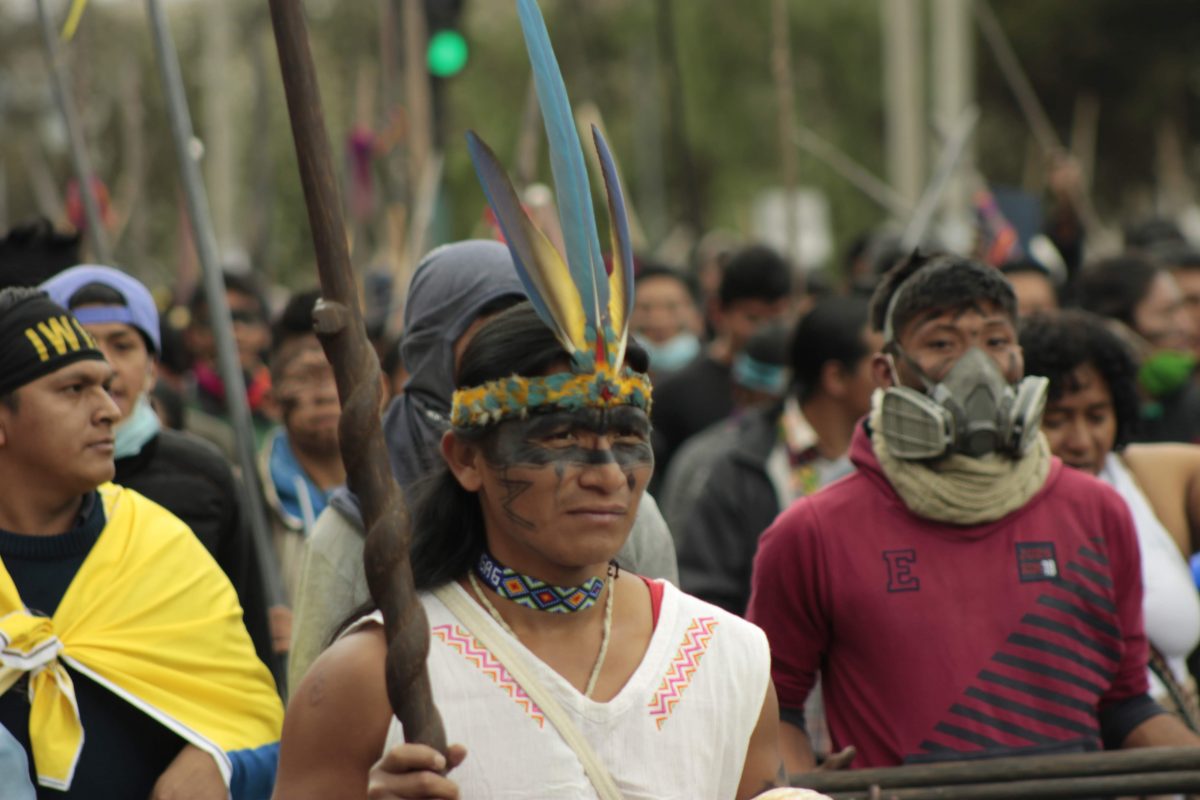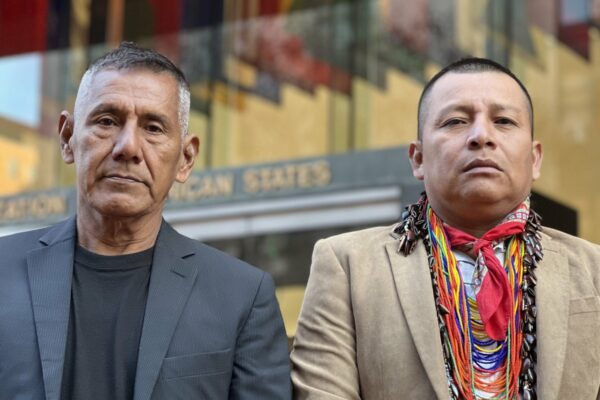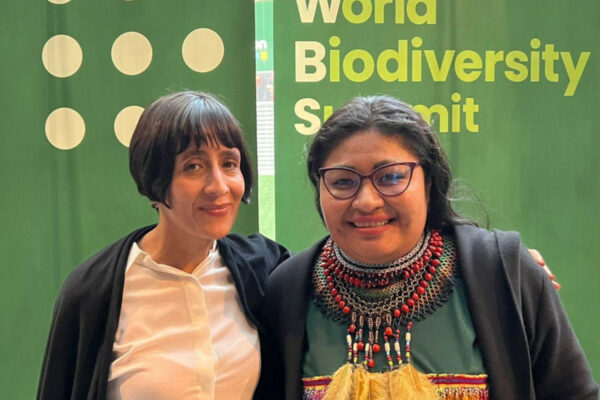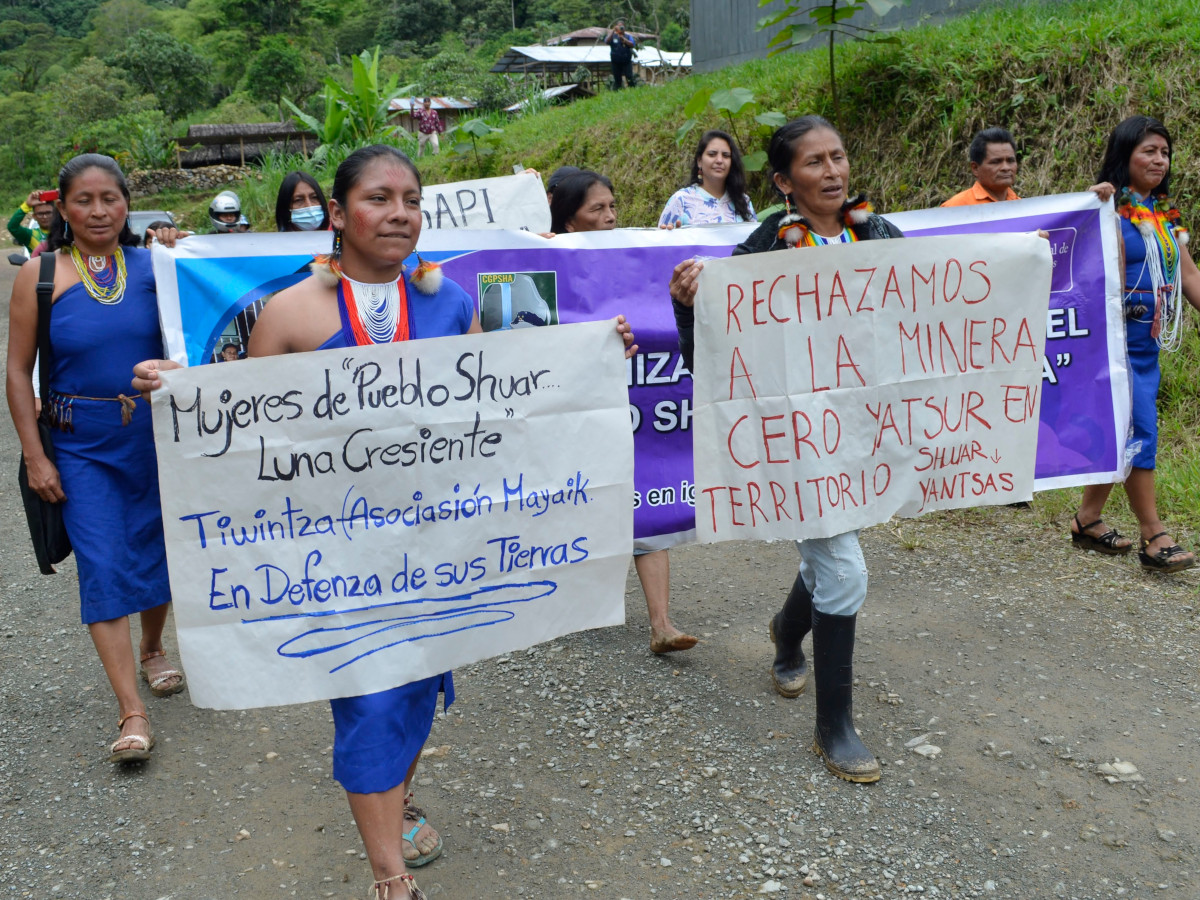UPDATE: Indigenous movement and government representatives announced the repeal of Decree 883, ending an eleven-day strike that paralyzed the country and was met with brutal police repression against indigenous peoples. Read more about this major victory here.
“We are peoples and nations who defend the lives of the people. We defend the life of the world. We take care of our rainforest, we take care of our Mother Earth and our rivers and our lakes, because it’s where we live. What we want for our territories is to be free of extraction. The only thing we’re asking for is justice.”
Jaime Vargas, President of the Confederation of Indigenous Nationalities of Ecuador (CONAIE)
A massive caravan of indigenous people from the Amazon arrived in Quito this morning, joining tens of thousands who have already concentrated in the capital in a national strike that has now entered its ninth day. The nationwide protests by the country’s indigenous movement have closed provincial highways and shuttered oil production, and the government has declared a state of emergency and curfew. Amazon Watch is on the ground and bearing witness first-hand to events taking place in Quito and working with our allies to raise and distribute humanitarian aid. We remain committed to standing with our partners in the indigenous movement during this time of crisis and beyond.
From the Andes to the Amazon, indigenous peoples have taken to the streets to reject the recently approved neoliberal austerity measures implemented by president Lenin Moreno and call for an end to new oil and mining extraction on their lands, among other demands. They’ve been met with tear gas, batons, and brutal state repression which has already caused several deaths. And the situation is getting more dangerous by the minute.
The Amazonians started the journey from their rainforest communities days ago, but they were prevented from traveling to the capital by police roadblocks and repression. Now in Quito, they took to the main stage at the Casa de Cultura, an arena in the city’s center where indigenous people have been rallying, meeting, and sleeping. Leaders from CONFENIAE, the regional Amazonian indigenous confederation, expressed their solidarity and demanded respect and dignity for all indigenous peoples across Ecuador.
“Brothers and sisters, since October 3rd, we have been on strike in our communities, territories, and in Amazonian cities demanding justice and respect for our rights which have been abused for too long. We have marched in the streets and have felt the same repression you have felt here in Quito.
But that has not stopped us! We have paralyzed three provincial governments and shut down oil production across the Amazon. We will not allow our rights and territories to continue to be exploited and extracted at the hands of a corrupt government.
We are here to restore our rights and dignity for all of our peoples! And we will not stop until our demands are met.”
Over 700 people have been arrested, 100 wounded, and at least four deaths from police violence have been confirmed. Amnesty International, the Inter-American Commission on Human Rights, the UN Special Rapporteur on the Rights of Indigenous Peoples, and other human rights organizations have denounced the excessive use of force by the military and police. The Moreno government had to evacuate his staff and key cabinet members to the coastal city of Guayaquil, keenly aware similar protests in the past have led to the toppling of multiple presidents.
The indigenous movement is calling on President Moreno to revoke Decree 883, which imposes draconian austerity measures on the country as a condition of a recent $4.2 billion loan from the International Monetary Fund (IMF). The measures cut subsidies on gasoline and diesel fuel, which will result in immediate and massive increases in all basic goods and services, and implemented creatively titled reforms like “wage bill realignment” and “public wage restraint” which unilaterally decimate labor rights and benefits.
“For centuries, we have protected our lands in the mountains and the Amazon, and we will not allow indigenous peoples, indigenous territories, and our global climate to pay the cost for the government’s mounting debt to China and international lenders,” said a statement from CONAIE, the national indigenous confederation, and CONFENIAE. “Once again, we are putting our bodies and our lives on the line to protect our families, rights, cultures, and territories, this time from the central government’s neoliberal assault.”
The crackdown on indigenous peoples has been shocking, even after the decade-long tenure of former president Rafael Correa, whose legacy of persecution and criminalization of civil society, the indigenous movement, and the press was unprecedented. Despite talk from the Moreno government of peace and openness to dialogue, security forces have viciously attacked indigenous people in the street and descended at night to evict thousands of them staying in the Salesiana University and the Casa de Cultura, indiscriminately firing tear gas into closed spaces where men, women, children, and elders were sleeping and cooking.
· #ATENCIÓN | Personal de @PoliciaEcuador lanza bombas lacrimógenas al interior de la Casa de la Cultura Ecuatoriana, donde se alojan miembros de comunidades indígenas. “Los policías nos acaban de cerrar el ágora con bombas a dentro” se escucha en el video. #ParoNacionaleEC pic.twitter.com/U3Q9iY9yqA
— Pichincha Comunicaciones (@pichinchauniver) October 10, 2019
In an address to the nation earlier this week, President Moreno tried to delegitimize the protests by attacking the perceived irony of opposing cuts to fossil fuel subsidies while calling for an end to the expansion of the fossil fuel frontier. But that simplistic spin ignores Ecuador’s long, tortured relationship with oil extraction.
Since the first barrel of crude was paraded through the streets of Quito and blessed by the Archdiocese of the Catholic church in the 1960s, this “black gold” from oil fields beneath pristine Amazonian rainforest and indigenous lands has failed to become the promised economic panacea for the country. Instead, an economy dependent on oil has trapped Ecuador in a downward cycle of debt and dependency and left a toxic legacy across indigenous territories in the Ecuadorian Amazon.
In fact, Ecuador’s spiraling debt is a direct result of oil-based loans and structural adjustment policies that encouraged or required expanded drilling. Consumer subsidies on gasoline and diesel are essential for transportation of the most vulnerable people in society in places like Ecuador and shouldn’t be equated with the need to end subsidies to the fossil fuel industry, which provide a lifeline to an otherwise financially failing industry.
Moreno’s announcement to cut fossil fuel subsidies coincided with his announcement that Ecuador would leave OPEC in 2020, freeing the country from production restrictions and allowing it to pursue new exploration. New oil production in Ecuador would come from roadless, intact Amazon rainforest which is home to dozens of indigenous nationalities who are adamantly opposed to oil extraction, including some living in voluntary isolation. It threatens one of the most biodiverse places on the planet, and it’s a bad long-term investment. New oil concessions will likely become stranded assets as indigenous peoples rise up to resist such projects and the global economy moves away from fossil fuels.
So while Ecuador is asking its people to bear the burden of a half century of oil-driven debt by wiping out fuel subsidies, it is making no attempt to fight oil-related corruption, which costs the country more than the subsidies. A 2018 investigation by the United Nations into energy industry projects in Ecuador found that some $2.5 billion was lost to corruption. On average, some $10 million per day is lost to corruption in Ecuador.
“Moreno is giving away our forests and territories to oil companies, and taking away our ability to move around the country. The government needs to protect its people, which means guaranteeing our rights, insuring basic means of transportation, and protecting the forest as well as our climate,” said Domingo Peas, an Achuar indigenous leader.
In Quito, where the smell of tear gas and burning tires has wafted for over a week, indigenous peoples are tired of broken promises. Over the last two years, the administration of Lenin Moreno made dozens of agreements and promises with the indigenous movement, including commitments to cease all new oil and mining concessions, investigate rights abuses associated with the extractive industry, and clean up contaminated lands. He broke them all. The indigenous movement engaged in dialogue in good faith with the government for more than a year, with scant results. This strike should not have come as a surprise to the Moreno administration. With little recourse left, the indigenous movement is exercising its constitutionally guaranteed right to resistance, to ensure their rights, cultures, forests, and territories are respected and protected.
Ecuador is in a hole, and it needs to stop drilling. Ecuador should leave OPEC and join other first mover governments who have committed to no new oil extraction. And the world should support countries like Ecuador – oil-dependent countries rich in biological and cultural diversity, with high levels of above-ground carbon – to keep fossil fuels in the ground and make a just economic transition to a post-carbon economy.
We have already seen much of the Brazilian Amazon burn to the ground. We can’t afford to lose the western Amazon to new oil extraction in pursuit of fossil fuels the world shouldn’t burn, and whose extraction is incompatible with the Paris Climate Agreement.
This moment of crisis presents Ecuador with a unique opportunity to heed the call of its people, support indigenous-led solutions, begin a transition to a post-petroleum economy, and put into practice the visionary concepts guaranteed by their constitution, including the rights of nature and buen vivir (“living well”), as well as respecting national and international laws on the rights of indigenous peoples. Now is the time to protect and defend the Amazon, indigenous rights, and the climate for our collective future.
Indigenous peoples and civil society across Ecuador are calling for peace, dignity, respect, and a restoration of their rights and democracy. They oppose the violent state repression that has been taking place since October 3rd. Amazon Watch stands in solidarity with the demands of the indigenous movement. We express our concern, support their demands, and denounce the excessive use of force and violation of basic human rights by the Ecuadorian military and police during the state of emergency.














